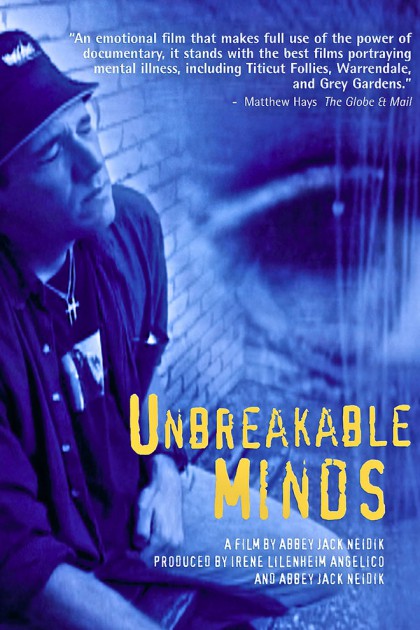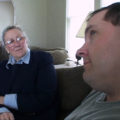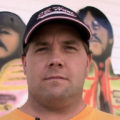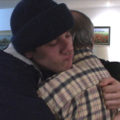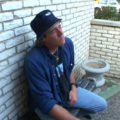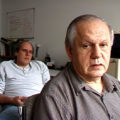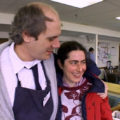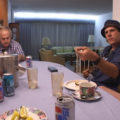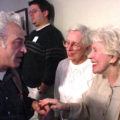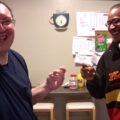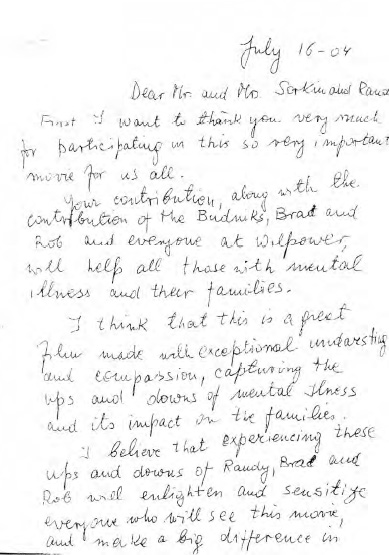
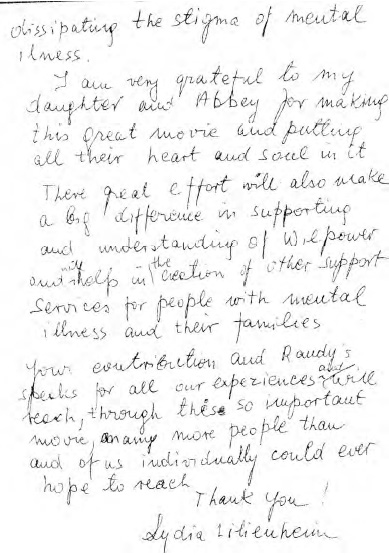
Dear Abbey and Irene,
I really felt honored to be a part of the screening of your fine film, last week at Wilpower. It was an especially warm and personal documentary, and I found it to be very “real” as well. Knowing both Rob and Nancy quite well myself, I feel like you captured their incredible strengths and humanness as they dealt with all they have to deal with, and make the most of it, in a way that is so much a model for us all.
This movie will help a lot of people understand mental illness too (and perhaps help open more group homes when the NIMBY response occurs).
Also one more rave comment. It was so finely constructed and made to be so real, but it flowed and was easy to watch, even beautiful at times. An awesome film, thanks for inviting me.
Josh Mark
Dear Abbey,
Congratulations on the rough cut of Broken Mind.
The characters are all so compelling – the parents, the three men, the staff of Wilpower. There’s a grace, a dignity and real bravery – dealing with the challenges schizophrenia, maintaining extraordinarily loving relationships, and taking every day as it comes, good or bad. It is truly inspirational and will resonate not only with families and individuals in similar situations, but with everyone.
I’ve been thinking a lot about the film since I saw it. I am off for a week tomorrow to attend story meetings on a new series but am writing to you to ask, if it is appropriate, for you to pass along my thanks and those of VisionTV to all of the participants in the film and, especially to Randy and his family. Letting us in to his struggle with medication was a brave and important thing to do. Randy and his family have given those of us with limited knowledge and experience of mental illness, a deep and valuable insight into the profound effects of medication, good and bad. Randy’s articulate frustration, the very apparent changes medication made in his personality and in his life were really eye-opening to me, and I know that they will be for our audience. He is a great character in the film and his relationship with his parents, particularly his father is very moving. That they clearly love each other so much despite the fluctuations the illness brings is an incredibly positive message.
Congratulations again Abbey. This is an important film and we are very grateful to all involved.
Best regards,
Alberta Nokes
Dear Abbey,
What a truly inspirational film! You’ve shattered my misperceptions of mental illness. I found every character loveable and engaging, (especially Randy). Randy takes us on a roller coaster ride of emotions. In your film, he becomes a victim of the wrong medication, but prevails in a big way despite horrible suffering. Please give my thanks to Randy. He’s my role model.
Sincerely,
Ai Umeda
Dear Abbey,
Thanks for the invitation to today’s screening of Broken Mind. It was a pleasure to watch your new film, which explores the delicate subject of mental illness with great tact and sensitivity.
At the heart of Broken Mind is how vividly and unobtrusively it portrays what it feels like for the afflicted person and his family. You’ve made a movie that will dispel stereotypes with its honesty and gentle intimacy. Bringing the audience in close to the people we meet will enlighten those who have vague, fearful ideas about conditions like paranoid schizophrenia. Randy and the other characters captivate us with their mixed emotions, their insights, their multilayered ways of communicating. Above all, we admire their brave struggles to survive in the real world – a world that often discriminates against them. The struggles and successes of the families we see are touchingly heroic.
Maurie Alioff
Dear Randy,
I am writing to you as a filmmaker who works for DLI productions, as an editor who assisted the project Broken Mind and also someone who is extremely moved by this film. To be honest, I learned a lot from this film and although I understand your concerns, I wanted to reassure you that you come across as somebody who is extremely bright, sincere and charming.
I have watched several hours of footage Abbey took in the last couple of years. I must say I have come to a better understanding of mental illness and am fascinated by your struggle to control this illness and as Nancy said, find your true self, who comes across as a gentle and generous soul. When I saw this film, my feeling was that this film will change people’s stereotypes about mental illness and maybe help lot of people to understand what you go through instead of stigmatizing people with mental illness.
I am confident that people will love you when they watch this film and I am hoping you can feel motivated to travel with this film and help to change the world to turn your illness into something positive.
Eylem Kaftan
Dear Randy,
I must admit that writing a letter to you is almost like writing a fan letter. I have only seen you in the movies, and like anyone we see on screen, you have become a bit of a movie star to me.
I am writing this fan letter to let you know how deeply touched and effected I was by your participation in The Broken Mind. As someone who knows little about Schizophrenia in particular or mental illness in general, The Broken Mind was truly an eye-opener for me. Not only because it gave me a glimpse into how people live with Schizophrenia on a daily basis, but because it made me realize that I held preconceived notions about mental illness that I was not aware of. It took a film like The Broken Mind to make me aware of my misconceptions, it also allowed me to challenge them, and finally, to erase them.
Above all, it was your personal insight and wisdom into your own trials and successes with Schizophrenia that touched me the most. Certainly there are hard days and dark periods when living with mental illness, but to know that there is always hope, love, acceptance and improvement just around the corner, as you proved in this film, is more inspirational and awesome than even you may know. I cannot put myself in your shoes, nor can I claim to understand even one iota of your experience, but through your involvement in The Broken Mind I have learned invaluable lessons about the reality of mental illness and hope to spread this knowledge to others, tearing down one taboo at a time.
Thank you for all the courage, generosity, and humour that you shared with the world through this film.
Best regards,
Michelle Diamond
Dear Randy,
I just want to let you know that I have seen the film and I think it’s great because it shows a part of the reality of mental illness. I feel that the film shows that the characters are all struggling to make things better – whether it’s their own medications or their relationships with family members. By the end of the film each character has achieved a lot of success.
As we see in the film, a lot of the public still doesn’t understand mental illness. That’s why what you’re doing is so important. You are educating people about an illness – from its effects, to the medical system’s difficulty in treating it, to the families’ support and love. People who see the film will be better informed and will be more likely to allow group homes to open in their neighbourhoods.
I think you showed a lot of courage in agreeing to be filmed. Your story shows how medications are always trial and error. You showed a lot of courage to try different medications. But you also showed a lot of courage in sticking with the one that worked best for you. Your story will break a lot of negative stereotypes about mental illness. But you also teach all of us that we should never give up. I think the film will help a lot of people.
Sincerely Yours,
Craig Segal, filmmaker and journalist
Dear Randy Sorkin,
Recently, I saw Abbey Neidik’s film about you, your family, and other people with problems like yours. I asked Abbey to pass this note onto you because I wanted to let you know that I really admire your strength and courage. Throughout the movie, you show a lot of determination, and a great sense of humor while dealing with a challenging situation. I believe that the film will educate and inspire people, and counteract negative myths.
I can easily imagine that other viewers may see you as a role model because you are someone who keeps moving, no matter what.
Sincerely,
Viviane Elnécavé
Dear Randy,
You don’t know me, but I’m writing you today as one of your new fans. I work from time to time with Abbey and Irene as an editor on their various films. My first contact with you and Brad came when I was cutting a two minute promo for the film. Right from the start I was excited by the footage and interested in the film that it could become.
A very close uncle of mine has a form of schizophrenia (I don’t know his exact diagnosis). Even though he’s in Boston and I’m in Montreal, he always made the effort to visit on my birthdays and on some holidays. I noticed my uncle was “different” from an early age, and it was difficult if not impossible for me to understand the true nature of his illness, or what it was like to be him. What I do know is that of all my aunts and uncles, he was and still is the most attentive and easy to talk to, because he really cares about people.
Watching your film, I saw my uncle in you, and you in my uncle. Never having vacationed or lived with my uncle, I’ve never seen him in a troubled state. But in the 50 or so minutes of your film, I was able to feel some of the ups and downs of your life, and I couldn’t help but project your experiences onto my Uncle David’s. You have had the courage to let me see what my uncle never allowed me to see. And although I can understand why my uncle would not want to share his difficult times with a nephew, I think that had I been permitted to know the whole person, we would have become even closer than we are.
All this to say that I admire your courage at having participated in the film. I was riveted to the screen from the very first seconds, and filled with explosions of surprise and understanding over and over. We need more documentaries like this one so that people all over can begin to come to terms with mental illness in a rational and compassionate way.
Let me tell you that in my mind at least, you come off as a kind of hero. Someone who is bright, a fighter, a lover, a family guy. Someone who respects family, friends, and has a love of life that you don’t find in everyone.
I am aware of your reticence to be seen in a bad light. But I have to tell you honestly that in my opinion, the film would have only a fraction of its value if the scenes in which you suffer were removed. We need to witness hardship sometimes (both yours and your family's) in order to feel compassion and to be driven to find out more.
So I write to thank you for an unexpected insight into my uncle’s life, to wish you ail the best with whatever you choose to do, and I hope that if you're ever in Montreal, we can meet for a coffee or something with Abbey.
Yours,
Howard Goldberg
Dear Randy Sorkin,
A few weeks ago I invited to see a screening of Broken Mind as it was in the final stages of post-production. I was really impressed with the film and the amount of time that it spanned which gave a much more truthful sense of people’s journey through the high and low times. I was also fascinated by the complexity of the situations as they unfolded. It was such a big step away from the usual stereotypes.
One of the main things that I learned was how unfortunate and unfair it is that the medications used for treatment have such an intense effect on people living with a mental illness. Throughout the beginning we see how well things are going for you while you’re on a medication that is very helpful and stabilizing. When your medication was changed it was clear that it was very hard on you and wasn’t working in a positive way as everyone had hoped.
There were times when I could really relate to you questioning and doubting the judgment of doctors. I know I would have too. As an audience member watching the scenes where you have to take something that makes you feel awful, I can really understand why you are getting frustrated and angry.
At the same time I sympathized with your family since they are doing the best that they can under the circumstances. Of course, as with any illness, some medication is needed but Broken Mind shows how it’s just not clear exactly what to use and it seems like there is always some kind of negative side effect that has to be factored in.
In the end it turns out that you and your family are strong enough to push through that difficult time and it is such a great contrast to see what good form you’re all in when you come out of the hospital. I think that your sense of humour and witty insight about it all is really inspiring.
This documentary had me laughing in some parts and feeling upset in others, which is exactly what a great film is supposed to do.
All the best to you and yours,
Sincerely,
Sara Beth Edwards
Dear Ms. McKie
The Substance Abuse and Mental Health Services Administration’s (SAMHSA) Resource Center to Address Discrimination and Stigma Associated with Mental Illness (AD Center) extend our thanks to you and your organizations for providing our agency with two copies of the DVD Unbreakable Minds.
You may remember that SAMHSA’s Center for Mental Health Services established the ADS Center with the mission to provide resources and information to assist in the designing and implementing of anti-stigma and anti-discrimination initiatives in the United States.
The material you have shared with us is vital to our ability to continue to promote the need for stigma reduction efforts associated with mental illness in the general public; and more importantly, to help those experiencing discrimination and stigma combat these issues.
The DVD Unbreakable Minds provides an insight into the difficulties faced by mental health consumers and their loved ones.
Again, we thank you for your contribution to our agency. We recognize that individuals like you, who have dedicated themselves in the fight against stigma and discrimination, are imperative in the advancements and success of stigma reduction efforts.
Thank you,
Michelle G. Hicks, Project Manager
Dedicated with love and admiration to
Michael, Henry and Lydia
directed by
Abbey Jack Neidik
produced by
Irene Lilienheim Angelico
Abbey Jack Neidik
edited by
Jeremiah Hayes
camera
Abbey Jack Neidik
sound
Irene Lilienheim Angelico
Zac Shank
written by
Abbey Jack Neidik
Jeremiah Hayes
Irene Lilienheim Angelico
narrated by
Irene Lilienheim Angelico
associate producer
Patrick Moss
original music
Freeworm
produced with the participation of
SODEC
Société de développement des entreprises culturelles - Québec
QUÉBEC CREDIT D'IMPOT CINEMA ET TELEVISION - GESTION SODEC
CANADIAN TELEVISION FUND, CREATED BY THE GOVERNMENT OF CANADA AND THE CANADIAN CABLE INDUSTRY
CANADIAN INDEPENDENT FILM AND VIDEO FUND / FONDS CANADIEN DU FILM ET DE LA VIDEO INDEPENDANTS
STAR CHOICE
THE CANADIAN FILM OR VIDEO PRODUCTION TAX CREDIT
produced in association with
VISION TV
executive producer - VisionTV
Alberta Nokes
CFCF CTV
in memory of
Bill Merrill
THE INDEPENDENT FILM CHANNEL
director of programming - IFC
Johanna Lunn Montgomery
KNOWLEDGE NETWORK
SCN
senior program manager - SCN
Cherie Westmoreland
CANADIAN LEARNING TELEVISION
director of programming - Access Media Group
Jill Bonenfant
musicians
Richard Deschenes - Bass
Denis Faucher - Piano
Fred Fortain - Guitar, Bass, Drums
François Richard - Keyboards
Jocelyn Tellier - Guitar
additional music
Mark Messing
Nina's Theme
Boat Coda
Pull Down the Shades
Lullaby for Medvedenko
additional music
Mark Messing and Max Callahan
(from Unspoken, a film by Frederick Marx)
Thinking Music
Traveling Song
sound design and editing
Benoît Dame
Sylvain Brassard
sound post-production
Audio Postproduction SPR Inc.
mixer
Dany Ouellet
online editor
Françoise Laprise
assistant online editor
Catherine Dubé
additional online editing
Ghislain Bergevin
video post-production
Virtua Post Production
closed captioning and transcriptions
CNST
research and proposal
Irene Lilienheim Angelico
Patrick Moss
additional direction
Irene Lilienheim Angelico
additional research
Barbara Schleifer
additional camera
Tod Lending
John Matlick
Toben Neidik
additional sound
Michael Schlesinger
Tarek Gamel El Din
production coordinators
Tania Cooper
SB Edwards
Michelle Diamond
production assistants
Eylem Kaftan
Zeynep Calasin
DJ Rahming
Daniel Schioler
production accountant
John Chretien
legal services
Robbins, Salomon & Patt, Ltd.
Michael Schlesinger
Jim DeZelar
and
Heenan Blaikie
Shari Segal
insurance
Taillefer Desjardins
film consultants
Lydia Lilienheim
Michael Lilienheim
with deep appreciation and thanks to all the participants
Randy
Brad Budnik
Rob Logan
Bette and Henry Budnik
Lois and Allen
Sue Shimon
Eva Martinez-Klich
Tom Peterson
Brett Padjen
Katy Fields
Josh Marks
and to
all of WilPower's members, staff and board of directors
thank you
Dr. Anthony M. D'Agostino
Dr. Daniel Johanna
Dr. Howard Margolese
Dr. Ashok Malla
Howard Goldberg
Jon Kalina
Celina Bell
Craig Segal
Maurie Alioff
Viviane Elnécavé
Ai Umeda
and special thanks to
Lydia Lilienheim
Henry Lilienheim
Michael Lilienheim
Sally Tessler
and
Toben Neidik
The effects of medication vary. What works well for one person, may not work for another.
With continued research, there is hope for an effective treatment for every person struggling with mental illness.
And with growing compassion and understanding, there will be a welcome place for everyone in our society.
produced by
DLI Productions

